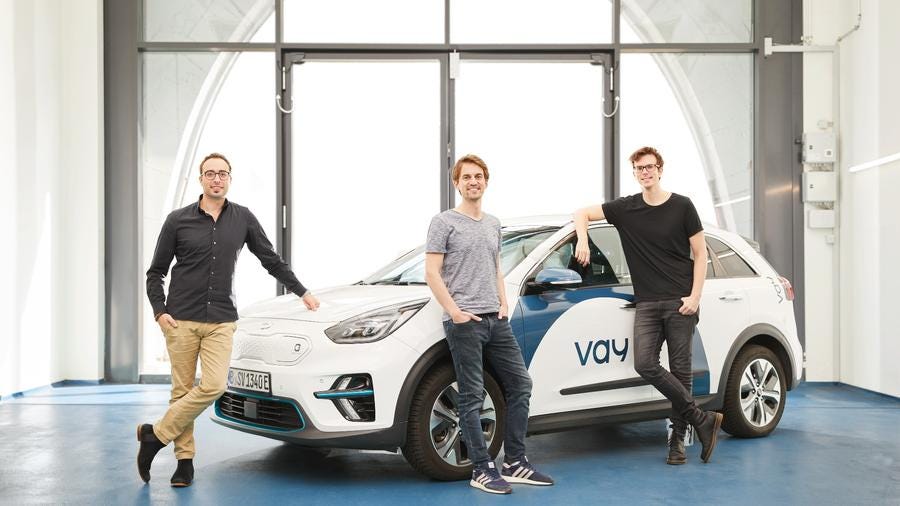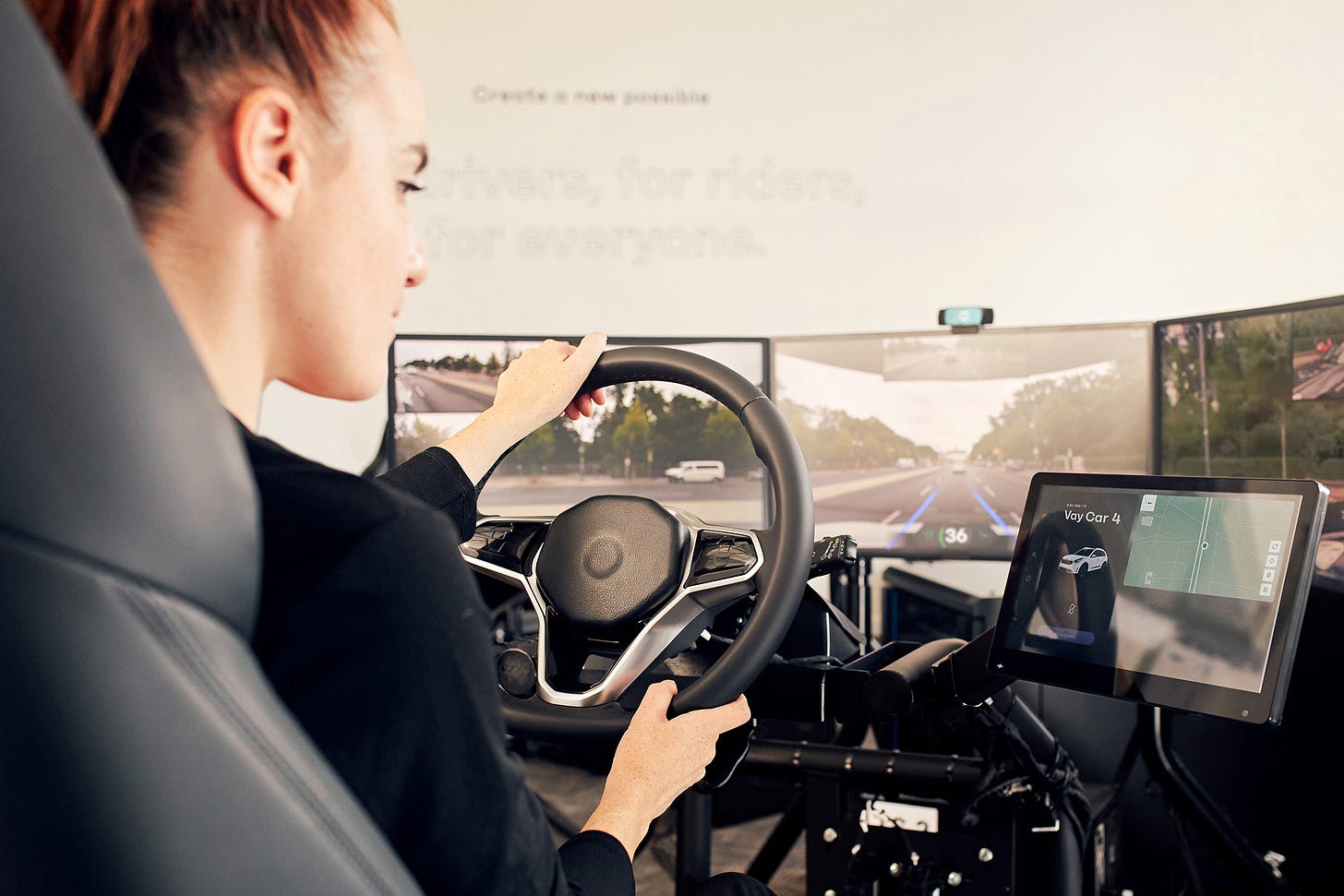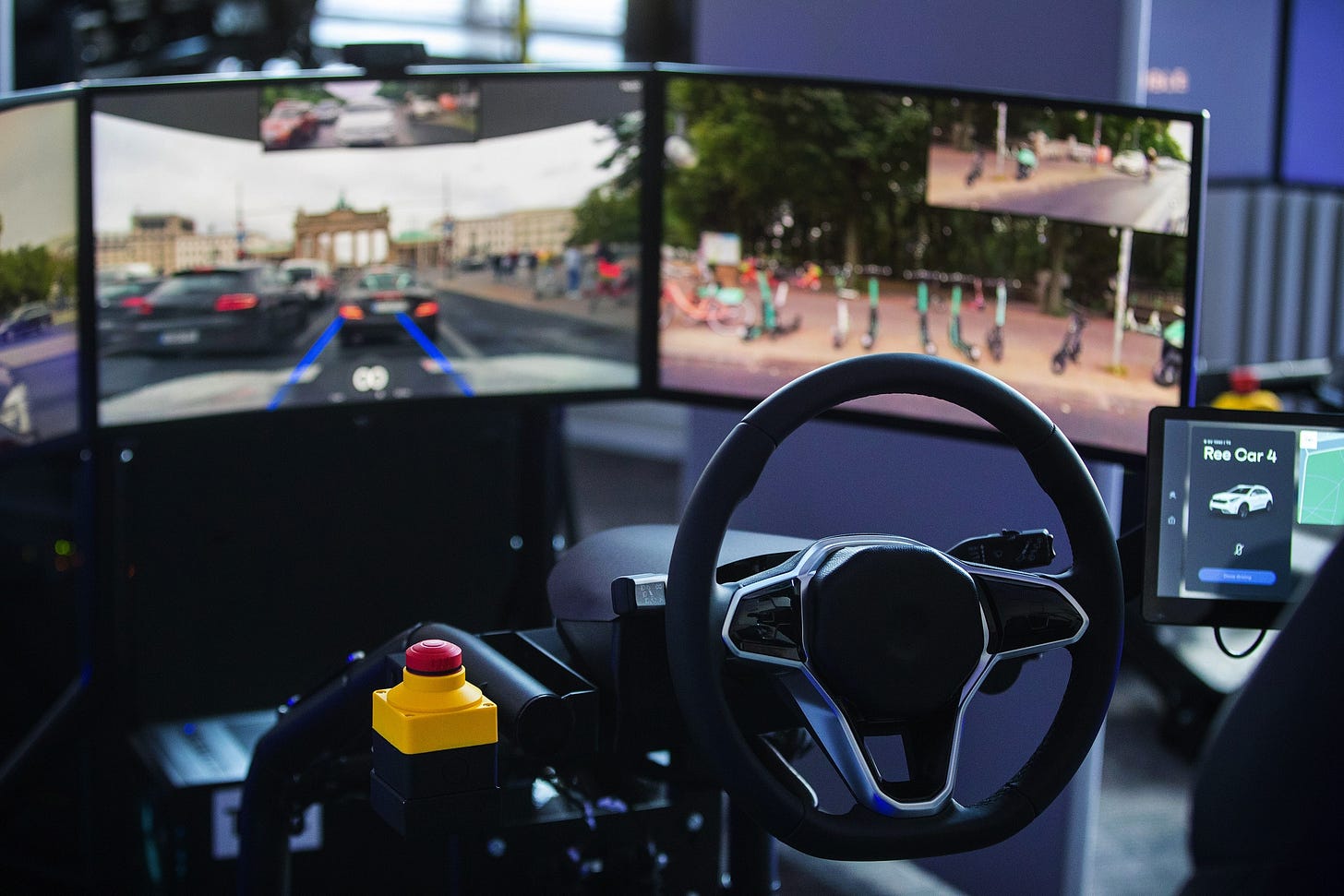The Weekly Deal CW20/24 - Vay
One Startup, once a week. This week we make an exception, talking about Vay, a Series-B mobility startup.
#Mobility #RemoteDriving #SmartCity
🥜 In a nutshell
Company: Vay
Industry: Mobility
Sub-Industry: Autonomous Driving, Smart City
Year Founded: 2018
HQ: Berlin, Germany
Stage: Series B
Founders: Bogdan Djukic, Fabrizio Ugo Scelsi, Thomas von der Ohe
Funding Amount: 110M€
Main Investors: La Famiglia, Project A, Atomico, Kinnevik, Eurazeo, Coatue
In a sentence: Vay, a Berlin-based startup, is revolutionizing the mobility landscape with its innovative "teledrive-first" approach to autonomous driving. Vay is live in Las Vegas streets and it is set to launch the first safety-certified commercial fleet of driverless vehicles on European public streets this year.
🔭 The Context
According to some recent data each year, approximately 1.2 million lives are lost in road traffic incidents, making them the primary cause of injuries and deaths among individuals aged 5–29.
The primary culprit behind many of these accidents? Human error, resulting from factors such as speeding, intoxication, distraction, and fatigue.
What if some of these factors could be reduced or eliminated'?
Vay's unique approach to autonomous driving combines the benefits of human expertise with advanced technology, offering a safe, reliable, and convenient mobility solution for customers.
💡 The Vision
Vay's teledrive-first approach challenges the status quo of traditional self-driving technologies by prioritizing human expertise and perception. Customers order an electric vehicle via the Vay app, and a teledriver brings the car directly to a valid pick-up location, remotely controlled from the teledrive center. Upon arrival, the customer drives themselves to their destination, and a teledriver takes over the vehicle at drop-off. This seamless process eliminates the need to search for parking, offering customers peace of mind and affordability.
Vay vs Driverless Cars
Vay's teledrive-first approach diverges from the conventional vision of fully autonomous vehicles, presenting key advantages and unique benefits:
Human Oversight: Unlike solely AI-driven systems, Vay integrates human teledrivers who remotely control vehicles, enhancing safety and adaptability in challenging situations like unexpected road conditions.
Safety Assurance: With safety as its priority, Vay ensures compliance with rigorous standards, offering customers a dependable mobility service that combines advanced AI with human judgment.
Seamless Experience: Vay's app-based service delivers electric vehicles directly to customers, eliminating parking hassles and simplifying the user experience for greater convenience.
Affordability: By utilizing existing electric vehicles and human teledrivers, Vay offers cost-effective alternatives to traditional car sharing and ride-hailing options.
Flexibility: Vay's approach enables teledrivers to handle diverse scenarios, from complex maneuvers to emergencies, leveraging human perception and decision-making for adaptability in dynamic urban environments.
The Impact
This approach not only instills confidence among passengers and regulators but also accelerates the acceptance and integration of autonomous technology into existing urban environments. Moreover, Vay's seamless integration with existing infrastructure and transportation networks optimizes resource utilization, minimizes environmental impact, and promotes sustainable transportation practices.
By empowering local economies through job creation and investment in local talent, Vay contributes to the growth and resilience of urban communities, driving social and economic progress in the mobility sector.
Safety First
At Vay, safety is paramount. With a core principle of "safety first," the company prioritizes high safety standards in all aspects of its operations. Vay develops its teledrive technology to meet rigorous safety requirements and provide customers with a reliable mobility service.
The Vay Teledrive Academy ensures that all teledrivers undergo extensive professional training, emphasizing safety at every step. In day-to-day operations, teledrivers work in a dedicated teledrive center designed to ensure maximum safety. With regular hours, frequent breaks, and a distraction-free environment, Vay ensures that safety remains at the forefront of its mission to redefine the future of transportation.
🔍 Some Info
📈 Market Size → $147.5B
The global Autonomous Vehicle market was valued at USD 147.54 Billion in 2022 and growing at a CAGR of 40.43% from 2023 to 2032. Now, these estimation should be investigated more when it comes to the autonomous mobility market.
👨🏻🔬 Technology & IP → 1 patent (available)
This patent describes an autonomous vehicle interface system. In this system, various nodes are distributed to independently process both low-level sensor data and high-level system data. The high-level system data is abstracted from the low-level sensor data, allowing for consistency in higher-level processing algorithms regardless of the system's configuration.
🛒 Business Model → B2C
Vay operates as a business-to-consumer (B2C) service, directly providing its teledriven electric vehicle services to individual customers through its mobile app. In the future, in my opinion, there may be an evolution towards a B2B and B2B2C approach.
🤝 Team → 3 co-founders + a growing team
The Vay team combines the bestof two worlds - software and product experience from Silicon Valley and automotive hardware & safety engineering from Europe. Investors include Kinnevik, Coatue, Eurazeo, Atomico, La Famiglia and Creandum, among others.
💰 Financials → 110M Series B funding
The company, has so far received $110 million in funding from investors including Swedish investment giant Kinnevik, U.S. fund Coatue and French private equity fund Eurazeo.
🥊 Competitors → Vaymo, Zoox, Cruise
In the competitive realm of autonomous mobility, Vay stands out with its innovative teledriving approach, setting itself apart from industry giants like Google Waymo, Amazon Zoox, Pony.ai, Mobileye, and Cruise. While Waymo and Zoox emphasize lidar technology, Vay's human operators remotely control its fleet of self-driving cars, offering a unique blend of human oversight and AI-driven autonomy. Despite facing formidable rivals, Vay's teledriving concept aims to bridge the gap between current autonomous capabilities and full autonomy, positioning itself as a pioneering force in Europe's self-driving development landscape.
👨🏻💻 My Critical View
While Vay's teledriving approach presents a novel and promising solution to the challenges of autonomous mobility, there are several critical factors and considerations that investors should weigh carefully.
Firstly, the reliance on human operators still introduces residual risks related to human error, training requirements, and scalability. These risks however, are still minor when compared to current AI-powered driverless cars maturity. Ensuring the consistent performance and reliability of remote operators across diverse driving scenarios will be crucial for maintaining safety standards and user trust.
Additionally, the regulatory landscape surrounding autonomous vehicles is complex and evolving, with varying requirements across different regions. Navigating these regulatory challenges and obtaining necessary approvals for teledriving operations could pose significant hurdles for Vay's expansion plans.
Moreover, the scalability of Vay's business model may face constraints as it relies on human-driven cars, which could limit its ability to rapidly scale operations and compete with fully autonomous solutions offered by industry leaders.
Pricing is another point. While Vay aims to offer an affordable alternative to traditional car sharing and ride-hailing options, ensuring competitive pricing in the dynamic mobility market may pose challenges. Factors such as operational costs, including those associated with remote operators and vehicle maintenance, will influence Vay's ability to maintain competitive pricing while sustaining profitability.
Finally, the long-term viability and competitive advantage of Vay's teledriving approach in a rapidly evolving market warrant thorough analysis, as technological advancements and shifts in consumer preferences may impact the demand for such services.
Stay tuned to discover the next startup on The Weekly Deal!










